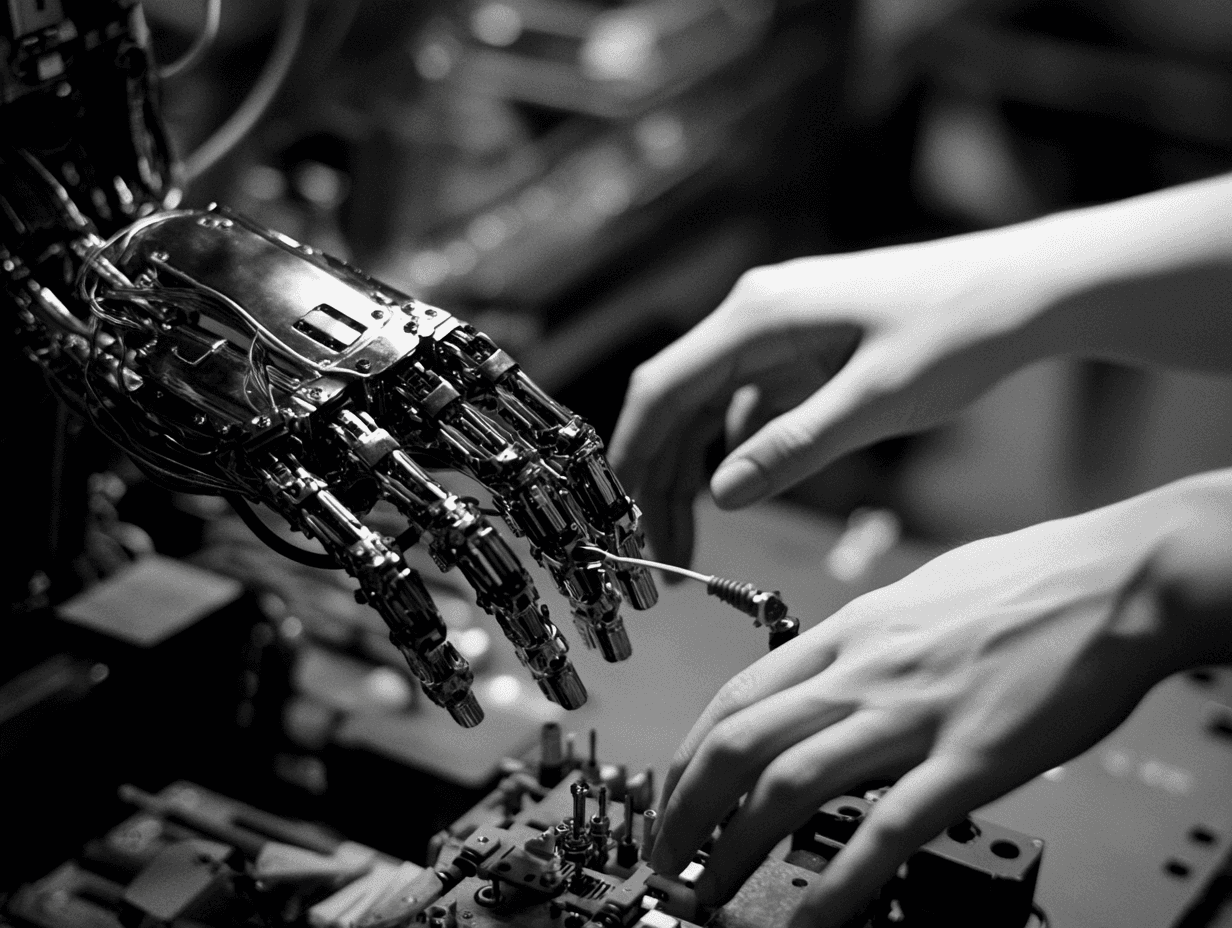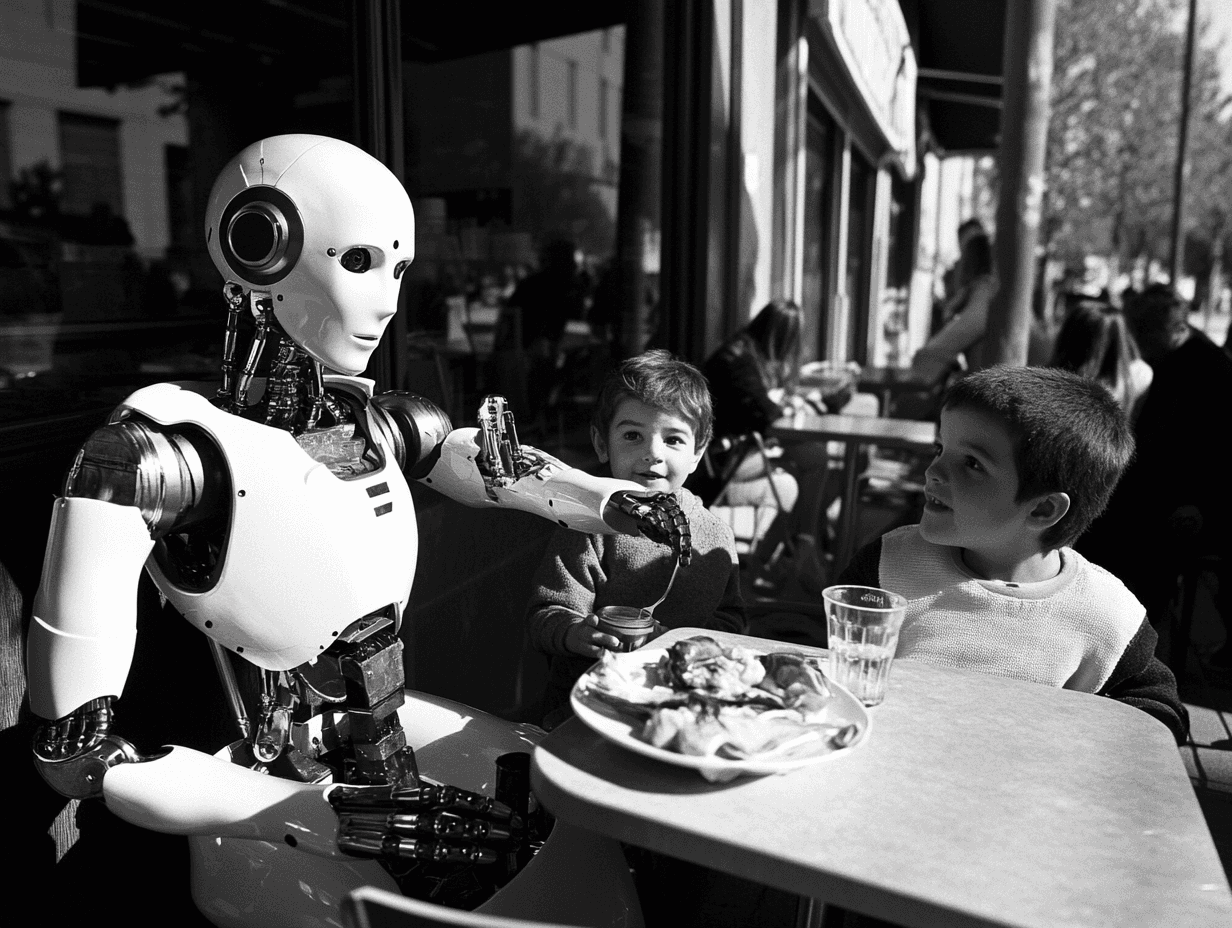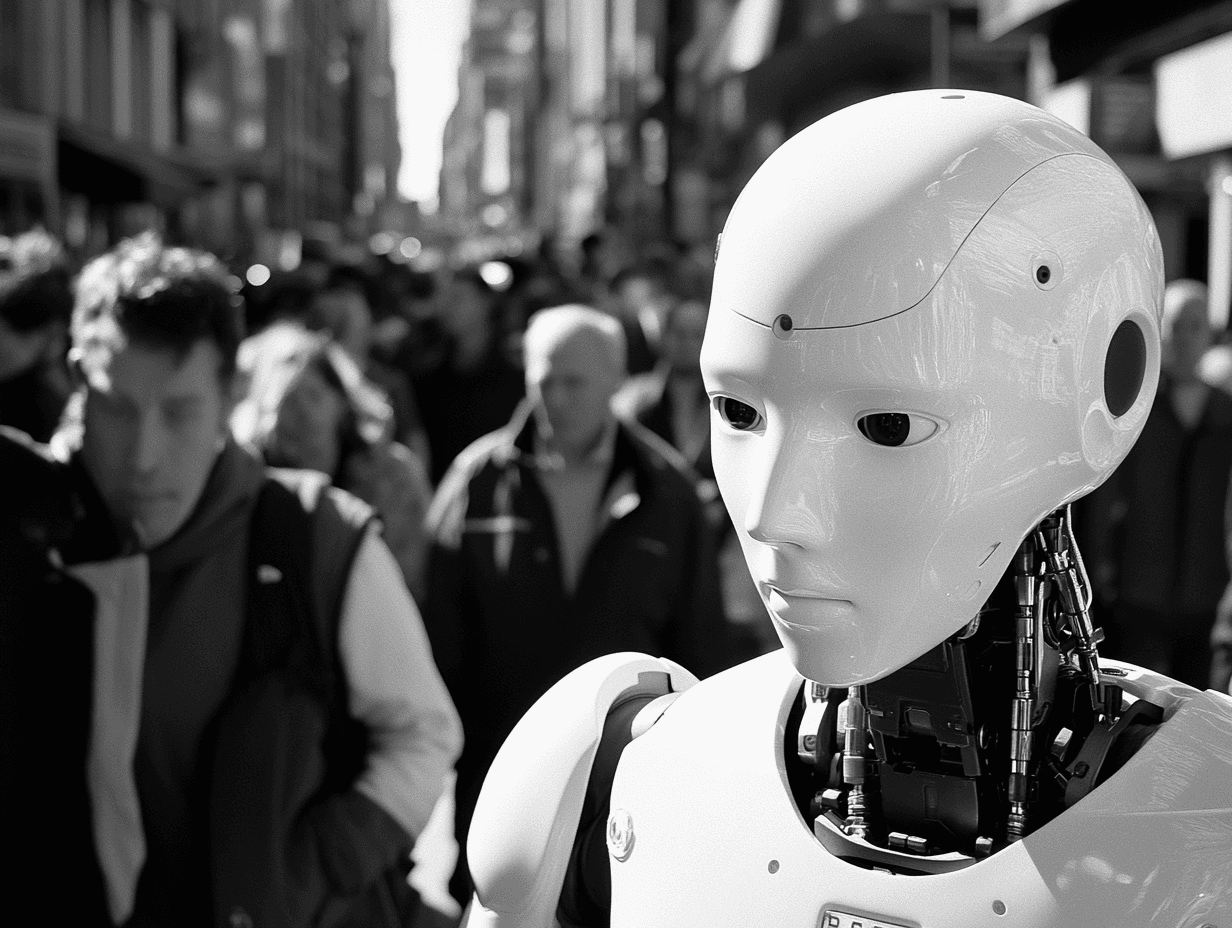Explore the dynamic intersection of automation, human connection, and generational challenges in this story of progress and balance.
By Light years Editorial Team
Oct 3, 2024
Recently, our team at Lightyears gathered around a screen, coffees in hand, to watch a series of talks streamed from UCLA's Royce Hall. We were watching the All-In Summit, hosted by the dynamic crew behind the *All-In Podcast*. The lineup featured bigwigs in the tech, business and government—names like Elon Musk, Peter Thiel, and J.D. Vance. But it was the unexpected appearance of Travis Kalanick, the controversial founder of Uber, that truly caught our attention and sparked a lively debate in the office.
Kalanick took the stage to and gave the audience a rare glimpse into his latest venture, The secretive CloudKitchens. He spoke with a mix of fervor and vision that's both captivating and, if we're honest, a bit unsettling. His big idea? Automating food production from inputing raw ingredients to outputting a delivery ready bag ready to be picked up by your favorite Food delivery service, with minimal human touchpoints, greatly lowering the labor costs of prepared food. He waxed poetic about the convergence of "bits and atoms," painting a picture of a future where the physical and digital worlds mesh seamlessly, but our minds lingered on the first idea.
We couldn't help but feel excitement. Could automation be the key to restoring lost purchasing power and offering a leg up to younger generations grappling with economic challenges? Or are we barreling toward a future where convenience trumps human connection, and efficiency comes at the expense of jobs, community and, well, humanity?
The Squeeze on Younger Generations
Let's rewind a bit and set the stage. It's no secret that millennials and Gen Z are feeling the financial pinch more than their predecessors did. We've all heard the jokes about millennials killing industries or being unable to afford houses because of their avocado toast habits. But behind the memes lies a stark reality that demands our attention.
A report from the Federal Reserve points out that millennials have accumulated less wealth than previous generations had at the same age. We're talking about factors like stagnant wages, skyrocketing education costs, and a housing market that's anything but friendly to first-time buyers, and of course generalized inflation on consumer products.
Wages, for instance, haven't kept up with the times. Between 1979 and 2019, productivity in the U.S. grew by a whopping 70%, but hourly pay nudged up by just 12%. People are working harder and better but not seeing much more in their paychecks. This isn't just unfair—it's a systemic issue that threatens the future of our economy.
Add to this the crushing weight of student loans. College tuition has ballooned over the past few decades, as have University Endowment funds. Adjusted for inflation, the average cost of undergraduate tuition and fees at public institutions rose significantly between 1989 and 2019. Many young adults are stepping into the workforce already deep in debt, hampering their ability to invest, save, or spend in ways that fuel the economy.
And let's not forget housing. Homeownership, once a cornerstone of the American Dream, is slipping out of reach for many. Studies have found that millennials have a lower homeownership rate than previous generations did at the same age. With housing prices soaring, saving up for that down payment on a starter home feels like chasing a moving target, we’re lucky if we find a single bedroom “minimalist loft”, in other words, a tiny room with white walls.
All these factors converge to create a challenging economic landscape for younger folks. This is more than an economic hiccup; it's a generational crisis that demands innovative solutions and critical thinking.
Automation's New Frontier: Beyond the Assembly Line
Against this backdrop, the allure of automation as a potential game-changer becomes more apparent. Automation has evolved from factory robots assembling cars to intelligent robots driving cars based on vision, just like humans do. Tesla's Optimus, a humanoid robot, is designed to handle repetitive or dangerous jobs, potentially transforming industries like manufacturing and logistics. Elon Musk suggests that Optimus could eventually take over household chores, giving people more time for creative and leisure activities.
Meanwhile, Waymo, formerly Google's self-driving car project, is making significant strides in autonomous transportation. Their vehicles navigate real-world traffic without human intervention, aiming to reduce accidents and improve traffic flow. In cities like Phoenix and San Francisco, residents are already hailing driverless taxis, experiencing firsthand the convenience and potential of this technology.
On another front, large language models, such as GPT-4, are breaking new ground in natural language processing. Capable of generating human-like text, voice, video, translating languages, and even composing music and poetry, from a single text prompt, these models are transforming how businesses handle customer service, content creation, and data analysis.

The Double-Edged Sword of Progress
While the benefits of automation are compelling, they come with challenges that can't be ignored. Job displacement is a significant concern. Tasks once considered secure because creativity was required are now susceptible to automation. Customer service roles, data entry, and even strategy, and consulting jobs are being transformed by AI.
A report by McKinsey suggests that by 2030, up to 375 million workers worldwide may need to switch occupational categories due to automation. This shift isn't just about losing jobs; it's about redefining work itself.
Facilitating a smooth transition for workers affected by automation requires a multifaceted approach. Investment in reskilling and upskilling is crucial. Governments and corporations should fund training programs focusing on in-demand skills. Microsoft's Global Skills Initiative, aiming to help 25 million people worldwide acquire digital skills, is a prime example.
Public-private partnerships can also play a significant role. Collaboration between the public sector and industry can create targeted training aligned with market needs. The TechHire initiative in the U.S. connects underserved communities with tech training and jobs, bridging the gap between potential workers and emerging opportunities.
Encouraging lifelong learning is essential. Offering tax credits or subsidies for continuous education can motivate workers to engage in ongoing skill development. Providing career transition support, such as counseling, job placement services, and mentorship, can help individuals navigate new career paths. Additionally, implementing or expanding unemployment benefits and providing financial support during retraining periods can alleviate economic pressures during transitions.
Reimagining Work and Education
As automation reshapes the employment landscape, education and skill development become more critical than ever. The traditional model of completing formal education early in life and relying on those skills indefinitely is no longer sufficient.
Educational institutions must evolve to prepare individuals for a future where continuous learning and adaptability are crucial. This means integrating emerging fields like AI, data science, and cybersecurity into curricula, emphasizing critical thinking, problem-solving, and adaptability. Flexible learning models, such as modular and stackable credentials, allow learners to build qualifications over time. Platforms like edX offer MicroMasters programs that exemplify this approach.
Partnerships with industry can ensure education aligns with current and future job market demands. Internship and apprenticeship programs bridge theory and practice, providing students with real-world experience. Emphasizing soft skills like communication, teamwork, and emotional intelligence—which are harder to automate—is equally important. Encouraging interest in STEM fields from a young age, particularly among underrepresented groups, can help build a diverse and capable workforce.
Unspun: Weaving Ethics into Innovation
Companies like Unspun demonstrate that technology and ethics can go hand in hand. Using 3D weaving technology, Unspun creates custom-fit apparel, reducing waste and promoting sustainability. Their approach focuses on openly sharing manufacturing processes, minimizing waste and carbon emissions, simplifying the supply chain, lowering costs and offering personalized products that meet individual needs.
Unspun's model shows that embracing innovation doesn't mean compromising on values. By prioritizing sustainability and ethical practices, they appeal to a growing market of conscious consumers.

Universal Basic Income and Alternative Solutions
Addressing the socioeconomic challenges posed by automation requires innovative solutions. While Universal Basic Income (UBI) has gained attention as a potential safety net, it faces criticisms regarding funding and effectiveness.
OpenAI's recent Unconditional Cash Study provides insightful data on how direct financial support can impact individuals and communities. Participants who received unconditional cash transfers reported a 35% increase in savings, enhancing their financial resilience. They increased their monthly spending on essentials like food, transportation, and rent by $310, indicating that the cash helped cover essential expenses. Health improvements were noted, with a 10% increase in participants receiving medical and dental care and a 20% decrease in problematic alcohol consumption.
However, participants worked 1.3 fewer hours per week and were 2% less likely to be employed, though they increased job search activities by 10% and were more likely to pursue education or start a business. This suggests that while immediate employment may decrease slightly, individuals are investing in their futures.
Considering the challenges associated with UBI, alternative solutions might address economic disparities intensified by automation. A Negative Income Tax provides supplemental income to those earning below a certain threshold, targeting assistance more efficiently. Universal Basic Services ensure access to essential services like healthcare, education, and housing, reducing living costs and improving quality of life. Conditional Cash Transfers, like Mexico's Prospera program, link financial aid to behaviors that improve long-term outcomes, such as children's school attendance.
Job guarantee programs, where the government acts as an employer of last resort, offering public service jobs to those who cannot find employment in the private sector, are another approach. Adjusting tax policies to redistribute wealth more effectively can fund social programs without placing undue burden on the economy.
Community and Connection in an Automated World
As automation streamlines services and interactions, maintaining human connection becomes increasingly important. While a robot can prepare and deliver food efficiently, it doesn't replace the experience of dining in a restaurant, engaging with staff, and enjoying the ambiance.
Businesses can take practical measures to preserve and enhance human connection. By automating routine tasks, staff can focus on personalized customer interactions. Designing customer experiences that encourage engagement and community building fosters loyalty and satisfaction. Training employees to provide exceptional service and address complex customer needs ensures that the human element remains central.
Supporting small businesses and artisans is also vital. Technology can help them maintain cultural experiences and personal interactions. Online marketplaces like Etsy and Shopify allow artisans to reach a global audience while maintaining their brand identity. Social media enables them to share their stories and creative processes, building a loyal customer base. Virtual experiences, such as workshops or studio tours, engage customers in new and interactive ways.
Balancing Innovation with Responsibility
The rapid pace of technological advancement requires thoughtful regulation and ethical considerations. Developing ethical frameworks in AI is crucial. These frameworks should ensure transparency, fairness, accountability, privacy protection, and human-centric design. Organizations like the AI Ethics Initiative and the Partnership on AI provide valuable guidelines.
Policymakers can create regulatory environments that protect consumers and workers without hindering innovation. Adaptive regulation, such as "regulatory sandboxes" where companies can innovate under guidance, allows flexibility while maintaining oversight. Involving industry experts, consumer groups, and academia in policymaking ensures a balanced approach.
Navigating Economic Inequality
Automation may exacerbate economic inequality if not managed carefully. Those with access to education and capital stand to benefit the most, while others may be left behind.
In developing countries reliant on manual labor, automation poses significant risks. Industries like textiles and manufacturing may see reduced demand for workers, leading to unemployment. To mitigate these challenges, investing in education, improving technological infrastructure, and encouraging economic diversification are essential steps.
Collaborative Efforts for a Shared Future
Creating a prosperous future in the age of automation requires collaboration across sectors. Public-private partnerships have effectively addressed challenges posed by automation. Singapore's SkillsFuture Initiative provides citizens with credits to pursue skills development courses. Germany's Dual Education System combines vocational training with apprenticeships, aligning education with industry needs. The UK's Catapult Centres foster innovation by bringing together businesses, academia, and government.
Consumers also play a role. By supporting brands that prioritize ethical practices and sustainability, they influence companies to adopt responsible policies. Advocacy, shareholder engagement, and demanding transparency can drive change.

Charting the Path Forward
Automation holds immense potential to improve lives and drive economic growth, but realizing these benefits for all requires deliberate action. Ensuring equitable access to technology is crucial. Governments should prioritize broadband access in underserved areas, provide affordable devices, and offer digital literacy education.
Automation can lead to greater prosperity, but risks of increased inequality exist. Addressing these involves inclusive economic policies, accessible education, strengthened safety nets, corporate responsibility, and global cooperation.
Building a Future That Works for Everyone
As our team at Lightyears discussed after watching the All-In Summit, we're at a pivotal moment. Automation is reshaping our world, presenting both opportunities and challenges. By proactively addressing the implications of technological advancements, we can create a future that embraces innovation while valuing human well-being and equity.
In the words of Sam Altman, "We have the potential to make the future dramatically better. But we have to take action to make it so.

References
[^1^]: Federal Reserve. (2020). "Survey of Consumer Finances." Retrieved from [Federal Reserve](https://www.federalreserve.gov/econres/scfindex.htm)
[^2^]: Economic Policy Institute. (2020). "The Productivity–Pay Gap." Retrieved from [EPI](https://www.epi.org/productivity-pay-gap/)
[^3^]: National Center for Education Statistics. (2021). "Tuition costs of colleges and universities." Retrieved from [NCES](https://nces.ed.gov/fastfacts/display.asp?id=76)
[^4^]: Urban Institute. (2018). "Millennial Homeownership." Retrieved from [Urban Institute](https://www.urban.org/urban-wire/yes-millennials-do-have-lower-homeownership-rates-and-theyre-likely-stay-lower)
[^5^]: Tesla. (2022). "Tesla AI Day Highlights." Retrieved from [Tesla](https://www.tesla.com/ai)
[^6^]: Waymo. (2023). "Waymo One: Fully Autonomous Ride-Hailing." Retrieved from [Waymo](https://waymo.com/waymo-one/)
[^7^]: OpenAI. (2023). "GPT-4 Technical Report." Retrieved from [OpenAI](https://openai.com/research/gpt-4)
[^8^]: McKinsey Global Institute. (2017). "Jobs Lost, Jobs Gained: Workforce Transitions in a Time of Automation." Retrieved from [McKinsey](https://www.mckinsey.com/featured-insights/future-of-work)
[^9^]: Microsoft. (2020). "Microsoft launches initiative to help 25 million people worldwide acquire the digital skills needed in a COVID-19 economy." Retrieved from [Microsoft News](https://news.microsoft.com/2020/06/30/microsoft-launches-initiative-to-help-25-million-people-worldwide-acquire-the-digital-skills-needed-in-a-covid-19-economy/)
[^10^]: U.S. Department of Labor. (n.d.). "TechHire Partnership Grants." Retrieved from [DOL](https://www.dol.gov/agencies/eta/techhire)
[^11^]: edX. (n.d.). "MicroMasters Programs." Retrieved from [edX](https://www.edx.org/micromasters)
[^12^]: Unspun. (n.d.). "Our Mission." Retrieved from [Unspun](https://www.unspun.io/)
[^13^]: OpenAI. (2023). "Unconditional Cash Study." Retrieved from [OpenAI](https://openai.com/blog/unconditional-cash-study)
[^14^]: Institute for Global Prosperity. (2017). "Social Prosperity Network Report: Universal Basic Services." Retrieved from [UCL](https://www.ucl.ac.uk/bartlett/igp/sites/bartlett/files/universal_basic_services_-_the_institute_for_global_prosperity_.pdf)
[^15^]: The World Bank. (2018). "Mexico's Conditional Cash Transfer Program: Paving the Path to Prosperity." Retrieved from [World Bank](https://www.worldbank.org/en/results/2018/06/14/mexico-conditional-cash-transfer-program-paving-path-prosperity)
[^16^]: AI Ethics Initiative. (n.d.). "Principles for Ethical AI." Retrieved from [AI Ethics Initiative](https://www.aiethicsinitiative.org/principles)
[^17^]: Partnership on AI. (n.d.). "About Us." Retrieved from [Partnership on AI](https://www.partnershiponai.org/about/)
[^18^]: Financial Conduct Authority. (n.d.). "Regulatory Sandbox." Retrieved from [FCA](https://www.fca.org.uk/firms/innovation/regulatory-sandbox)
[^19^]: SkillsFuture Singapore. (n.d.). "About SkillsFuture." Retrieved from [SkillsFuture](https://www.skillsfuture.gov.sg/AboutSkillsFuture)
[^20^]: Federal Ministry of Education and Research. (n.d.). "The German Vocational Training System." Retrieved from [BMBF](https://www.bmbf.de/en/the-german-vocational-training-system-2129.html)
[^21^]: Catapult Network. (n.d.). "About Catapults." Retrieved from [Catapult](https://catapult.org.uk/about-us/)
[^22^]: Altman, S. (2021). "Moore's Law for Everything." Retrieved from [Sam Altman](https://moores.samaltman.com/)

